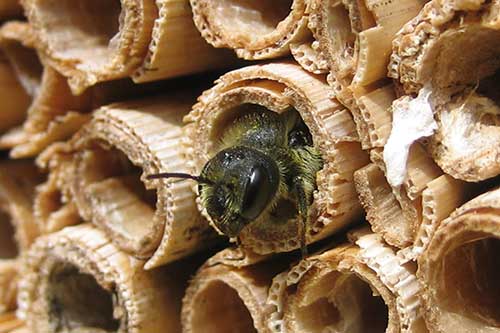At least 1,500 species of insects, including bumblebees, honeybees, hoverflies, wasps, butterflies and moths, pollinate plants in the UK. Insect pollination is important for the production of many crops, including apples, strawberries and tomatoes, but these important insects are under threat from multiple pressures including loss of habitat, intensive farming, pesticides and disease.
Scientists, councils and conservation organisations in Bristol are aiming to reverse the decline in insect numbers by working together to promote a joined-up approach to pollinator conservation across the city.
Partners Avon Wildlife Trust, Bristol City Council, Bristol Friends of the Earth, Buglife, South Gloucestershire Council, the University of Bristol and the University of the West of England have developed the Greater Bristol Pollinator Strategy following a public consultation on a draft version earlier this year and feedback from the Bristol Pollinator Summit held in February.
Launched at the first meeting of the Bristol Pollinator Forum on 25 March, the strategy will provide a mechanism for people to work together to protect existing habitat and increase the amount of pollinator habitat across the Greater Bristol urban area, and also raise awareness of the importance of insect pollinators among the public, business and private landowners.
The strategy is part of the Get Bristol Buzzing initiative which will link together activities related to pollinator conservation throughout Green Capital year and into the future. The initiative builds on many successful projects already underway in Bristol including the University of Bristol’s Urban Pollinators Project which has been researching pollinators in Bristol over the last three years and Bristol City Council’s Meadow Bristol project.
Dr Katherine Baldock, of the University of Bristol’s Urban Pollinators Project said: “Get Bristol Buzzing aims to inspire a joined-up approach to pollinator conservation across the Greater Bristol Urban Area, helping individuals and organisations create suitable habitat for insect pollinators throughout the city – in gardens, public spaces and on business sites too.
“We have developed the strategy following feedback from key stakeholders, including community groups, to make sure that there is the best chance of success.”
Funding has been provided by Defra to support the local Pollinator Strategy and the launch of Get Bristol Buzzing during Bristol Green Capital 2015. Defra will also fund the creation of three flower meadows, one in South Gloucestershire and two on Bristol City Council land. Such meadows improve the diversity and abundance of bees, flies and other pollinating insects. The local strategy for the Greater Bristol area builds on the National Pollinator Strategy for England which was published by Defra in November 2014.
Find out more at www.getbristolbuzzing.org #getbristolbuzzing
